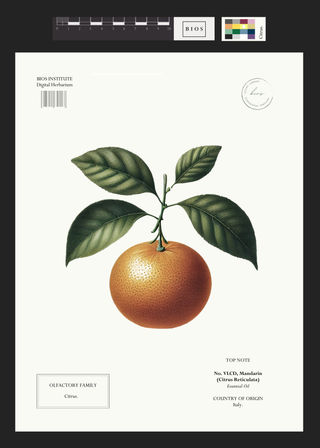

Citrus reticulata, commonly known as mandarin or mandarin orange, is native to China. It is believed to have originated in regions that include the southern part of China and northeastern India.
Mandarin oranges have a long history of cultivation in China, and they were spread to other parts of the world through trade and exploration. Today, mandarins are widely grown in many countries with suitable climates for citrus fruit production, including countries in Southeast Asia, Europe, the Americas, and Africa. Ours is sourced from Italy.
In perfumery, mandarin adds a delightful and energetic note to fragrance compositions. Its scent is characterized by its juicy, citrusy, and slightly floral aroma. Mandarin is often described as sweet, tangy, and refreshing, making it a popular choice in creating fragrances that evoke a sense of joy, playfulness, and optimism.
Mandarin is a Top note in our Citrus family. Its bright and cheerful nature makes it an excellent choice for creating an immediate impact and setting a lively and uplifting tone. Mandarin blends well with other citrus notes like lemon, bergamot, and grapefruit, enhancing their brightness and adding complexity to the fragrance.
In addition to its citrus qualities, mandarin can have a slightly floral undertone with hints of sweetness. This aspect allows it to blend harmoniously with floral, fruity, and spicy notes, adding a touch of softness and enhancing the overall fragrance profile. Mandarin can bring a juicy and vibrant element to floral bouquets, add sweetness to gourmand compositions, or provide a bright accent to woody or spicy fragrances.
The fragrance of mandarin is often associated with feelings of happiness, vitality, and optimism. Its uplifting and cheerful nature can evoke a sense of freshness, playfulness, and youthful energy. Mandarin fragrances are commonly used in products such as perfumes, colognes, fruity scents, and products designed to create a cheerful and uplifting atmosphere.
Apart from its aromatic qualities, mandarin is also known for its potential therapeutic benefits. Its sweet and uplifting scent is believed to have mood-enhancing properties, promoting relaxation and reducing stress. Mandarin essential oil is often used in aromatherapy practices for its calming and soothing effects.
Overall, mandarin brings a joyful and invigorating quality to perfumes. Its sweet and citrusy aroma, with hints of floral and sweetness, adds a lively and refreshing touch to fragrance compositions, making it a cherished ingredient in the world of perfumery.
Mandarin oranges are often associated with festive occasions, particularly during the Chinese New Year. They are considered symbols of good luck, abundance, and prosperity. Mandarin oranges are exchanged and offered as gifts during this time to bring blessings and wishes for a prosperous year ahead.
Mandarin oranges may be used as offerings in rituals and ceremonies to honor deities, spirits, or ancestors. They are seen as gifts of gratitude and reverence. The bright and vibrant color of mandarins symbolizes vitality and positive energy, making them appropriate for spiritual offerings.
Mandarin is sometimes used in rituals for cleansing and purification purposes. Its citrusy and refreshing scent is believed to have purifying qualities that can help cleanse negative energy and promote a sense of renewal. Mandarin essential oil may be diffused or incorporated into ritual baths to cleanse the mind, body, and spirit.
Mandarin's uplifting and joyful aroma makes it suitable for rituals aimed at boosting energy, invoking positivity, and enhancing mood. Its scent is believed to promote feelings of happiness, playfulness, and optimism. Mandarin may be diffused, used in aromatic rituals, or incorporated into practices that seek to uplift and invigorate the participants.
Mandarin can be used as a symbolic representation in rituals. Its bright orange color and sweet fragrance symbolize abundance, prosperity, and vitality. Mandarin may be included in altars, decorations, or ritual objects to invoke a sense of joy, positive energy, and growth.
Mandarin
- Unit price
- /per
Please note this product format is a small vial that contains roughly 20 drops of scent concentrate. This can be purchased à la carte but is intended to be used with our Perfume Kit.
SCENT SPECIFICATIONS
Latin Name: Citrus Reticulata
Extraction Method: Cold Pressed
Country of Origin: Italy
All of the scents in our library our naturally derived - our collection includes essential oils, absolutes, concretes, isolates, enfleurage, macerations, oleoresins, and mixed medium naturals.
Adding product to your cart
Citrus reticulata, commonly known as mandarin or mandarin orange, is native to China. It is believed to have originated in regions that include the southern part of China and northeastern India.
Mandarin oranges have a long history of cultivation in China, and they were spread to other parts of the world through trade and exploration. Today, mandarins are widely grown in many countries with suitable climates for citrus fruit production, including countries in Southeast Asia, Europe, the Americas, and Africa. Ours is sourced from Italy.
In perfumery, mandarin adds a delightful and energetic note to fragrance compositions. Its scent is characterized by its juicy, citrusy, and slightly floral aroma. Mandarin is often described as sweet, tangy, and refreshing, making it a popular choice in creating fragrances that evoke a sense of joy, playfulness, and optimism.
Mandarin is a Top note in our Citrus family. Its bright and cheerful nature makes it an excellent choice for creating an immediate impact and setting a lively and uplifting tone. Mandarin blends well with other citrus notes like lemon, bergamot, and grapefruit, enhancing their brightness and adding complexity to the fragrance.
In addition to its citrus qualities, mandarin can have a slightly floral undertone with hints of sweetness. This aspect allows it to blend harmoniously with floral, fruity, and spicy notes, adding a touch of softness and enhancing the overall fragrance profile. Mandarin can bring a juicy and vibrant element to floral bouquets, add sweetness to gourmand compositions, or provide a bright accent to woody or spicy fragrances.
The fragrance of mandarin is often associated with feelings of happiness, vitality, and optimism. Its uplifting and cheerful nature can evoke a sense of freshness, playfulness, and youthful energy. Mandarin fragrances are commonly used in products such as perfumes, colognes, fruity scents, and products designed to create a cheerful and uplifting atmosphere.
Apart from its aromatic qualities, mandarin is also known for its potential therapeutic benefits. Its sweet and uplifting scent is believed to have mood-enhancing properties, promoting relaxation and reducing stress. Mandarin essential oil is often used in aromatherapy practices for its calming and soothing effects.
Overall, mandarin brings a joyful and invigorating quality to perfumes. Its sweet and citrusy aroma, with hints of floral and sweetness, adds a lively and refreshing touch to fragrance compositions, making it a cherished ingredient in the world of perfumery.
Mandarin oranges are often associated with festive occasions, particularly during the Chinese New Year. They are considered symbols of good luck, abundance, and prosperity. Mandarin oranges are exchanged and offered as gifts during this time to bring blessings and wishes for a prosperous year ahead.
Mandarin oranges may be used as offerings in rituals and ceremonies to honor deities, spirits, or ancestors. They are seen as gifts of gratitude and reverence. The bright and vibrant color of mandarins symbolizes vitality and positive energy, making them appropriate for spiritual offerings.
Mandarin is sometimes used in rituals for cleansing and purification purposes. Its citrusy and refreshing scent is believed to have purifying qualities that can help cleanse negative energy and promote a sense of renewal. Mandarin essential oil may be diffused or incorporated into ritual baths to cleanse the mind, body, and spirit.
Mandarin's uplifting and joyful aroma makes it suitable for rituals aimed at boosting energy, invoking positivity, and enhancing mood. Its scent is believed to promote feelings of happiness, playfulness, and optimism. Mandarin may be diffused, used in aromatic rituals, or incorporated into practices that seek to uplift and invigorate the participants.
Mandarin can be used as a symbolic representation in rituals. Its bright orange color and sweet fragrance symbolize abundance, prosperity, and vitality. Mandarin may be included in altars, decorations, or ritual objects to invoke a sense of joy, positive energy, and growth.
